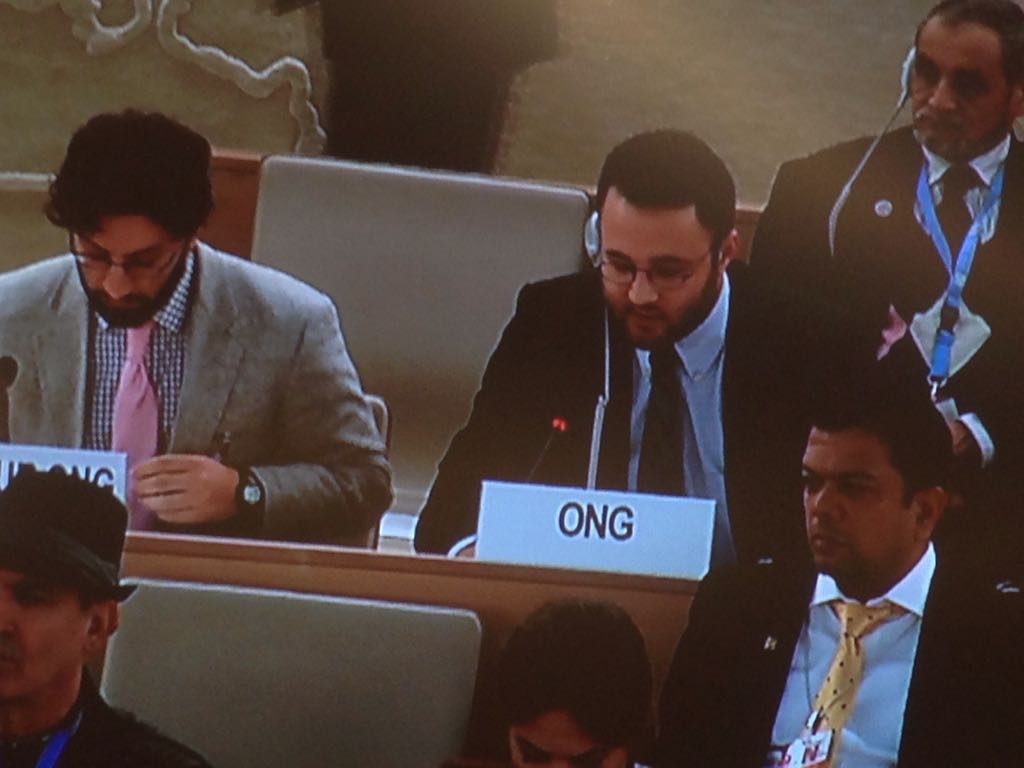Humanists at the UN Human Rights Council have condemned the practice of discrimination by “caste”, which continues in a number of countries, highlighting India as an egregious example.
Chief Executive of the International Humanist and Ethical Union (IHEU), Gary McLelland, delivered the oral statement in Geneva on Tuesday 20 March 2018.

Gary McLelland makes a statement at the UN Human Rights Council
McLelland outlined the horrific practice of manual scavenging across India, in which some 180,000 people live in squalor and are forced to do menial and dangerous jobs. Millions more belonging to so-called “lower castes” suffer life-long discrimination.
Prior to the current session of the Human Rights Council, the IHEU made a written submission on caste discrimination in India, focusing on manual scavenging. (Download, PDF)
The interventions come just two months after McLelland, as well as the IHEU’s Director of Advocacy, Dr. Elizabeth O’Casey, returned from a two week visit to IHEU Member Organizations across India.

Gary McLelland, IHEU Chief Executive
Speaking from Geneva, McLelland said:
“I am pleased to be able to speak out about the awful and inhuman practice of caste discrimination at the United Nations. Humanist campaigners in India, and across the world, rightly oppose this shameful practice.
“Humanism has a rich and diverse history across India, where even today over one fifth of IHEU’s Member Organizations are based in India.
“Visiting India in January, I was moved to see both the scope and quality of the campaign and education work being done there. The incredible dedication of our Indian colleagues, often in the face of threats of violence and intimidation, is an inspiration to the rest of the world.
“With the support of so many dedicated and passionate colleagues in India, I call upon the Indian government to make renewed and serious efforts to stamp out the scourge of caste discrimination. It is time for real action.”
The statement was supported by:
- Babu Gogineni, former Director of IHEU and founder of Indian Humanists and the South Asian Humanist Association (SAHA)
- Balwinder Barnala, Secretary of the Punjab Rationalist Society
- Prof. Narendra Nayak, President of the Federation of Indian Rationalist Associations (FIRA)
- Sujatha Surepally, Hyderabad-based anti-caste campaigner
- Vidya B Rawat, founder of the Social Development Foundation
The full text of the statement is as follows:
UN Human Rights Council, 37th Session (26th February – 30th March 2018)
General Debate on Item 9 (Durban Declaration)
Gary McLellandThank you Mr President,
Caste discrimination is a pernicious and deeply ingrained form of structural discrimination, involving massive violations of civil, political, economic, social and cultural rights. Caste systems, based on the doctrine of inequality, divide people into unequal and hierarchical social groups and are inherently contrary to the very essence of the Durban Declaration.
Caste-based discrimination takes many forms, one of which being restrictions on occupation. Those at the bottom, known as ‘Untouchables’ or Dalits, are restricted to the most menial, dirty and dangerous jobs as defined by the caste hierarchy. One such job is manual scavenging, the practice of manually cleaning, carrying, disposing or handling human and animal excreta from dry latrines, sewers and streets, using brooms, small tin plates and baskets carried on the head.
Since Dalits are considered to be polluted by reason of their birth, the task of removing human and animal waste is allocated to them and strictly enforced. They have to work in filthy, abhorrent and life-threatening conditions and are socially ostracised by most of society.
Over 180,000 households in rural India are involved in manual scavenging and seven manual scavengers died in the first week of 2018, highlighting the failures of previous and current government attempts to end this dehumanising practice.
Although India has an extensive body of legislation, outlawing caste-based discrimination and the practice of manual scavenging, political will to ensure implementation is lacking and discrimination from the village level up to the government level continues unabated.
We urge this council to put all possible pressure on India to ensure decision makers at all levels take action to stop caste-based discrimination in reality and the human rights violations that it brings with it.
Notes
- The International Humanist and Ethical Union is the global representative body of the humanist, atheist and secularist movement. Based in New York and operating in London and Brussels. The IHEU represents the humanist movement at the United Nations and other international institutions.
- Gary McLelland was appointed Chief Executive of the IHEU in February 2017, for more information see: https://humanists.international/about-us/staff-and-representatives/
- The statement was delivered under Item 9 of the 37th Session of the UN Human Rights Council in Geneva on Tuesday 20 March 2018.
- For more information contact Bob Churchill on [email protected] or +44 (0) 20 7490 8468.